2 Ton Magnetic Lifter Cost and Features for Efficient Material Handling
Understanding the Price of a 2-Ton Magnetic Lifter
In the realm of industrial lifting equipment, magnetic lifters have emerged as one of the most efficient tools for handling ferrous materials. The capability to lift heavy loads effortlessly makes them indispensable for warehouses, steel mills, and construction sites. Among the various lifting options available, a 2-ton magnetic lifter stands out as a popular choice for many businesses. In this article, we will explore the factors affecting the price of a 2-ton magnetic lifter and provide insights on how to select the right equipment for your needs.
What is a Magnetic Lifter?
A magnetic lifter is a device that uses a magnetic field to lift and move heavy ferrous objects. Employing an electromagnet, these lifters can securely grip items such as steel plates, pipes, and other iron-related materials. The operation is simple when switched on, the lifter generates a strong magnetic field, allowing it to latch onto the item being lifted. When the work is done, the magnet can be turned off, releasing the object effortlessly.
Factors Influencing the Price
1. Quality of Materials The price of a 2-ton magnetic lifter often reflects the quality of materials used in its construction. High-quality steel and durable components can enhance the lifespan and reliability of the lifter, leading to higher initial costs but potentially lower long-term expenses due to reduced maintenance and replacement needs.
2. Brand Reputation Well-established brands typically command higher prices due to their reputation for quality and customer service. Brands that have invested in research and development to enhance safety features, magnetic strength, and overall performance often set higher price points due to their proven track record.
3. Features and Specifications Advanced features such as safety locks, adjustable lifting heights, and ergonomic designs can also drive up the price of magnetic lifters. Some models come equipped with indicators to show the operational status, helping users avoid potential hazards. The level of technology and innovation integrated into the lifter influences its market price.
4. Load Capacity and Performance While the standard capacity for a magnetic lifter labeled as 2-ton is 2000 kilograms, actual performance can vary depending on the specific conditions and materials being lifted. Factors such as surface roughness, material thickness, and even temperature can affect lifting capability. Higher performance specifications can lead to a price increase.
magnetic lifter 2 ton price

5. Supplier and Market Demand The sourcing of the product plays a key role in determining its price. Different suppliers may have varying pricing strategies based on availability and market demand. Seasonal demands in construction or manufacturing sectors can also affect prices, leading to fluctuations.
Average Price Range
When seeking a 2-ton magnetic lifter, expect to encounter a price range typically between $300 to $1,200. Entry-level models may be priced closer to the lower end of the spectrum, while premium quality products from reputable manufacturers can reach the upper end. Price variations can also be influenced by geographic location and supply chain factors.
Making Your Purchase Decision
When looking to purchase a 2-ton magnetic lifter, it is essential to analyze your specific needs. Consider the following
- Intended Use Clarify what materials you will be working with and the environment in which the lifter will be used. - Budget Set a budget that aligns with your operational needs and projected ROI. - Safety Standards Investigate safety features and ensure they comply with industry standards. - Warranty and Support A robust warranty and customer support can add significant value and peace of mind.
Conclusion
Investing in a 2-ton magnetic lifter can significantly enhance operational efficiency in industries that deal with heavy materials. While price varies based on quality, brand, features, and market dynamics, it is crucial to choose a lifter that meets your lifting requirements while ensuring safety and reliability. By carefully considering your options and understanding the factors influencing price, you can make an informed decision that benefits your operations in the long run.
-
Unlock Seamless Relocation with Our Heavy Equipment Moving ExpertiseNewsJun.06,2025
-
Unleash Unrivaled Flexibility with Our Adjustable Gantry CraneNewsJun.06,2025
-
Unleash Heavy-Duty Efficiency with Our Industrial Gantry Crane SolutionsNewsJun.06,2025
-
Revolutionize Steel Handling with Our Magnetic Lifter RangeNewsJun.06,2025
-
Master Equipment Mobility with Premium Machinery Mover SolutionsNewsJun.06,2025
-
Elevate Your Material Handling with Magnetic Lifter TechnologyNewsJun.06,2025
-
YS Permanent Lifting Magnets: The Smarter Way to Handle SteelNewsMay.22,2025
